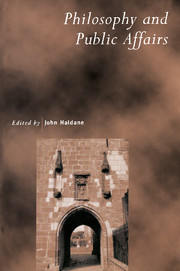Book contents
- Frontmatter
- Contents
- Notes on Contributors
- Introduction
- In Defence of Individualism
- Market Boundaries and Human Goods
- A Tale of Three Karls: Marx, Popper, Polanyi and Post-Socialist Europe
- Liberty's Hollow Triumph
- Politics, Religion, and National Identity
- Contemporary Art, Democracy, and the State
- Popular Culture and Public Affairs
- Welfare and the State
- Questions of Begging
- Philosophy and Educational Policy
- What did John Dewey Want?
- Educating for Citizenship
- Being Human: Science, Knowledge and Virtue
- Index
Educating for Citizenship
Published online by Cambridge University Press: 20 May 2010
- Frontmatter
- Contents
- Notes on Contributors
- Introduction
- In Defence of Individualism
- Market Boundaries and Human Goods
- A Tale of Three Karls: Marx, Popper, Polanyi and Post-Socialist Europe
- Liberty's Hollow Triumph
- Politics, Religion, and National Identity
- Contemporary Art, Democracy, and the State
- Popular Culture and Public Affairs
- Welfare and the State
- Questions of Begging
- Philosophy and Educational Policy
- What did John Dewey Want?
- Educating for Citizenship
- Being Human: Science, Knowledge and Virtue
- Index
Summary
Two short paragraphs, 42 and 43, in the White Paper, Excellence in Schools, published in July 1997, announced the UK government's intention to educate for citizenship:
Schools can help to ensure that young people feel that they have a stake in our society and the community in which they live by teaching them the nature of democracy and the duties, responsibilities and rights of citizens.
How they will deliver this remains unclear – not least to the Government itself – which is perhaps why they then followed the time honoured course of setting up an advisory group ‘to discuss citizenship and the teaching of democracy in our schools’. (When in doubt – set up a committee.) The membership of that Committee will wield enormous influence in shaping an agenda which cuts to the heart of how a person perceives their relationship with the wider community. It is foolish to underestimate the high stakes involved as politicians seek to define citizenship.
The debate about ‘educating for citizenship’ has become a cipher for a more fundamental debate about philosophy and theology, relativism and absolutism, values and virtues, the individual and the community. Some are using it as a smokescreen to see off religious education and the daily act of worship in schools – which in the light of the extraordinary outpouring of spontaneous, but frequently unstructured, religious feeling over the tragic death of Diana, Princess of Wales, is a lamentable response to a nation trying to find spiritual meaning to questions of mortality and immortality.
- Type
- Chapter
- Information
- Philosophy and Public Affairs , pp. 175 - 188Publisher: Cambridge University PressPrint publication year: 2000

